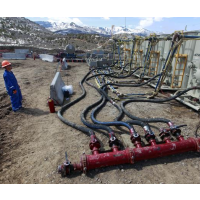U.S. Oil Demand Strains Water Supplies in Other Countries
 Water pressure is monitored at oil production site (AP photo)
Water pressure is monitored at oil production site (AP photo)
America’s need to import oil from other countries has the unintended consequence of straining water supplies in foreign petroleum-producing lands.
A new study published in the Proceedings of the National Academy of Sciences revealed the importing and exporting of oil tends to have an “international water footprint” because drilling operations require a lot of water. But the water strain on other nations is far greater due to U.S. oil demand than is caused by such demand from any other country.
“Our analyses demonstrate that the US petroleum sector is reliant on economic activity in countries/regions of the world that are exposed to significant pressures on renewable freshwater resources (e.g., India, Pakistan) and where it may be difficult to implement the necessary market reforms to safeguard freshwater resources,” the study’s authors wrote.
About 73% of all the water associated with the United States’ oil demand comes from international sources. That’s considerably more than the worldwide total, in which 56% of the oil sector’s water needs come from countries outside of where demand for that oil originates, according to ThinkProgress.
Water requirement related to U.S. oil needs is more than three times as much as that of China, where 22% of its oil sector’s water needs come from international sources.
-Noel Brinkerhoff
To Learn More:
Oil Demand in the U.S. Can Stress Water Supplies in Countries Thousands of Miles Away (by Katie Valentine, ThinkProgress)
U.S. Thirst for Oil Straining International Water Supplies (by Bobby Magill, Climate Central)
Global Impacts of Energy Demand on the Freshwater Resources of Nations (by Robert Alan Hollanda, Kate A. Scott, Martina Flörke, Gareth Brown, Robert M. Ewers, Elizabeth Farmer, Valerie Kapose, Ann Muggeridge, Jörn P. W. Scharlemanne, Gail Taylor, John Barrett, and Felix Eigenbrod, Proceedings of the National Academy of Sciences)
- Top Stories
- Unusual News
- Where is the Money Going?
- Controversies
- U.S. and the World
- Appointments and Resignations
- Latest News
- Trump Orders ICE and Border Patrol to Kill More Protestors
- Trump Renames National Football League National Trump League
- Trump to Stop Deportations If…
- Trump Denounces World Series
- What If China Invaded the United States?






Comments